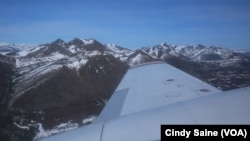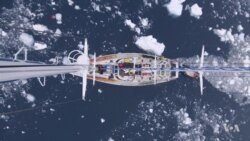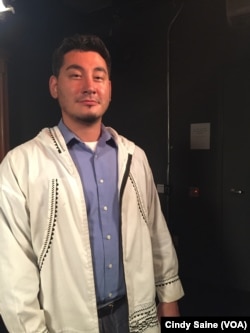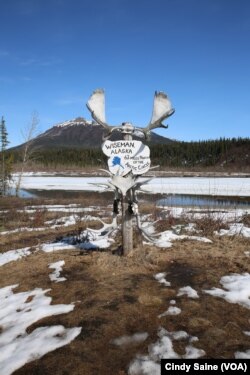The foreign ministers of the eight Arctic Council nations will meet to discuss climate change this week, amid news last month that temperatures in the pristine region are warming at twice the rate of the rest of the world.
A high-level meeting with U.S. Secretary of State Rex Tillerson and his counterparts from Russia, Greenland, Canada, Norway, Finland, Sweden and Iceland begins Thursday in Fairbanks.
As Tillerson joins the talks, the Trump administration has not yet decided whether to remain a party to the 2015 U.N. Paris Agreement on responding to climate change.
Watch: Alaskan Natives Look to Arctic Council to Preserve Waters, Way of Life
Any changes to U.S. climate policy would directly affect the lives of Alaska Natives, who depend on the Arctic Sea to survive.
In recent reports, scientists said the temperatures in the Arctic were warming at twice the rate of the rest of the world, sea ice was at record lows and permafrost was thawing.
If current warming rates hold, the world could see an ice-free Arctic by 2040, researchers said.
Worrisome
The studies have alarmed Alaska Natives.
Gabe Tegoseak spoke to VOA about growing up in an Inuit household.
"To put that in perspective, I grew up with no running water most of my life," Tegoseak said. "A very old-school tradition, my parents they favored it that way and it humbles me.
"I had to walk to a freshwater lake, break some ice on my sled — and this is a wooden sled I used to pull around and break it up — and then bring it home, and that was our drinking water, this big block of ice," he said.
As the ice block melted, Tegoseak's family first used it for drinking water, then to wash their faces and bodies, and then to clean the floor, not wasting a drop, he said.
Many people in Alaska, including indigenous people, depend on the oil and gas industry for a paycheck, he told VOA. But he said he thought an executive order signed this month by President Donald Trump to reverse Obama administration policy and open up Arctic waters to drilling was shortsighted.
"We're trading our rights and our ability to subsistence hunt and live traditionally, which is over 10,000-plus years old, for a cash economy, which [is a] different mindset. So when we catch a whale, for instance, we share it all," Tegoseak said.
"Our view is that everybody gets to [have] a piece of whale, and it doesn't matter, creed or color. Everybody gets a fair share," he stressed.
Tegoseak said he had asked many Alaska Natives on the North Slope about what they'd do if they had to choose between having their beloved whale meat, called muktuk, or an iPad. They responded that they'd choose muktuk, he said.
Seen as shortsighted
Many environmental experts agree that drilling in the Arctic is risky and shortsighted, including Sally Yozell of the Stimson Center, a nonpartisan research center in Washington.
"I think it's rather shortsighted for a number of reasons. You know the Arctic waters are cold, and it's hard to — we have not figured out yet how to address an oil or gas calamity up there at all. I mean, the cold water, all one has to do to is to have witnessed what happened with the Exxon Valdez many years ago to see that that oil stayed in those waters for 20 years," Yozell said.
The Valdez tanker struck a reef in Prince William Sound on March 24, 1989. Nearly 11 million gallons of oil was spilled.
Experts said the accelerated melting of Arctic Sea ice will most likely lead to more shipping, drilling and other economic activity in the region.
Mark Royce of Conservatives for Responsible Stewardship told VOA he was concerned.
"Unfortunately, the retreating ice, the diminution of the perpetual winters there, and the warming of their environment is giving rise to still more steam for plans for rapacious exploration and exploitative development," Royce said. "It's a vicious cycle. But what we're seeing in the Arctic, in the very seas around Alaska, presents just a particularly virulent form of this at a crucial time."
Tillerson's remarks will most likely be followed closely by the other seven Arctic Council partners, who want to make climate change a focus of the final statement when the meeting concludes Thursday.









